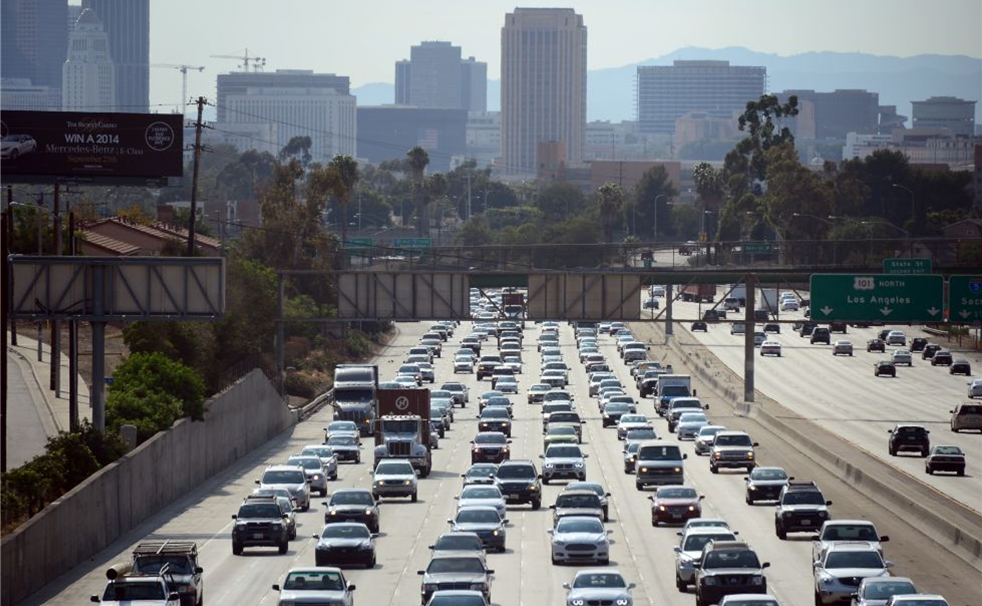During the early hours of November 11, a fire erupted in a storage yard underneath the I-10 freeway near downtown Los Angeles, structurally compromising a large section of the road and resulting in, what was at the time, claimed to be an indefinite closure of the busiest freeway interchange in the world. Luckily, the freeway was reopened less than two weeks later on November 20, after round-the-clock work to shore up the structure until permanent repairs of scorched support columns can be completed.
Immediately following the fire on November 11, California Governor Gavin Newsom proclaimed a state of emergency in Los Angeles County to expedite repairs to the freeway. Much like the I-95 closure that occurred near Philadelphia in June, the incident became national news as the closures posed a major inconvenience to the hundreds of thousands of commuters that pass through the freeway daily. However, Los Angeles’ traffic chaos long predates this major incident and much of the coverage of the additional difficulties for commuters in the city seems to be glossing over the bigger issue that is plaguing L.A. citizens, Angelenos.
Much of the mainstream coverage regarding the disaster has focused on how the closures will affect Los Angeles’ commuters in the short term, but mainstream outlets gave no additional coverage to the problems they are forced to contend with daily. L.A. is a deeply car-dependent city — a city-wide alert was sent out via wireless emergency alert notifying drivers of the freeway closure around 10:30 p.m. Sunday night. The alert advised citizens to “plan alternative routes and expect significant traffic.”
Angelenos are also no strangers to gridlock traffic. In L.A., the average driver spent an estimated 95 hours last year — just shy of four days — stuck in traffic, according to the transportation analytics firm Inrix. On the first Monday following the I-10 closure, many Angelenos took to social media to express their frustration at the traffic conditions they face daily.
Man, if only I-10 was open, this traffic would all disappear pic.twitter.com/KIGUIvAUZw
— Jake Gotta (@jake_gotta) November 13, 2023
Previous attempts to alleviate congestion have been unsuccessful. A study found that L.A.’s most recent plan to add more lanes to the 405 Freeway — which took half a decade to construct and cost more than $1 billion — actually made rush-hour traffic even worse.
It is not surprising that the plan backfired. When cities add more space for cars, more people drive in that space, and congestion gets worse. The roads themselves cause traffic.
Widening freeways and building more roads has also resulted in the demolishing of homes, businesses and community spaces. This happens in neighborhoods that have long suffered the negative effects of freeways, including hazardous air, resulting health risks, and noise pollution.
“That kind of government-led action could further perpetuate the inequities borne by Black and brown residents, who are disproportionately affected by freeways,” wrote Ryan Fonseca for the Los Angeles Times.
Los Angeles is in dire need of a more effective city-wide public transportation system. The major disruption caused by a portion of a freeway being closed is not only a sign that L.A. is dangerously dependent upon cars, but also that there is little alternative available for its citizens to help take the heat off this closure.
Currently, the major public transport available to the public is the L.A. Metro, a rail and busway system that serves the entirety of Los Angeles County. While it is widely available and affordable for Angelenos, the system has been plagued by crime, resulting in reluctance from the public to adopt it for everyday usage.
Los Angeles Mayor Karen Bass has made revamping the Metro a top priority.
“Almost 50 people have died on the system this year,” said Bass in July. “We must acknowledge that ridership is still down, and the reduction is disproportionately among women, riders who report that they do not feel safe. And we must address the increase in human suffering that we have seen on our system.”
The only way to reduce traffic congestion is to to get people out of their cars and onto reliable and safe public transit. That way, a freeway closure would have significantly less impact on commuters.
Bass said during her first “State of the Agency” address as board chair, “Metro is truly an essential service, but for Los Angeles to thrive in fact, Los Angeles to survive in the future, Metro cannot be mostly a system of last resort. It must be a system of first choice.”

